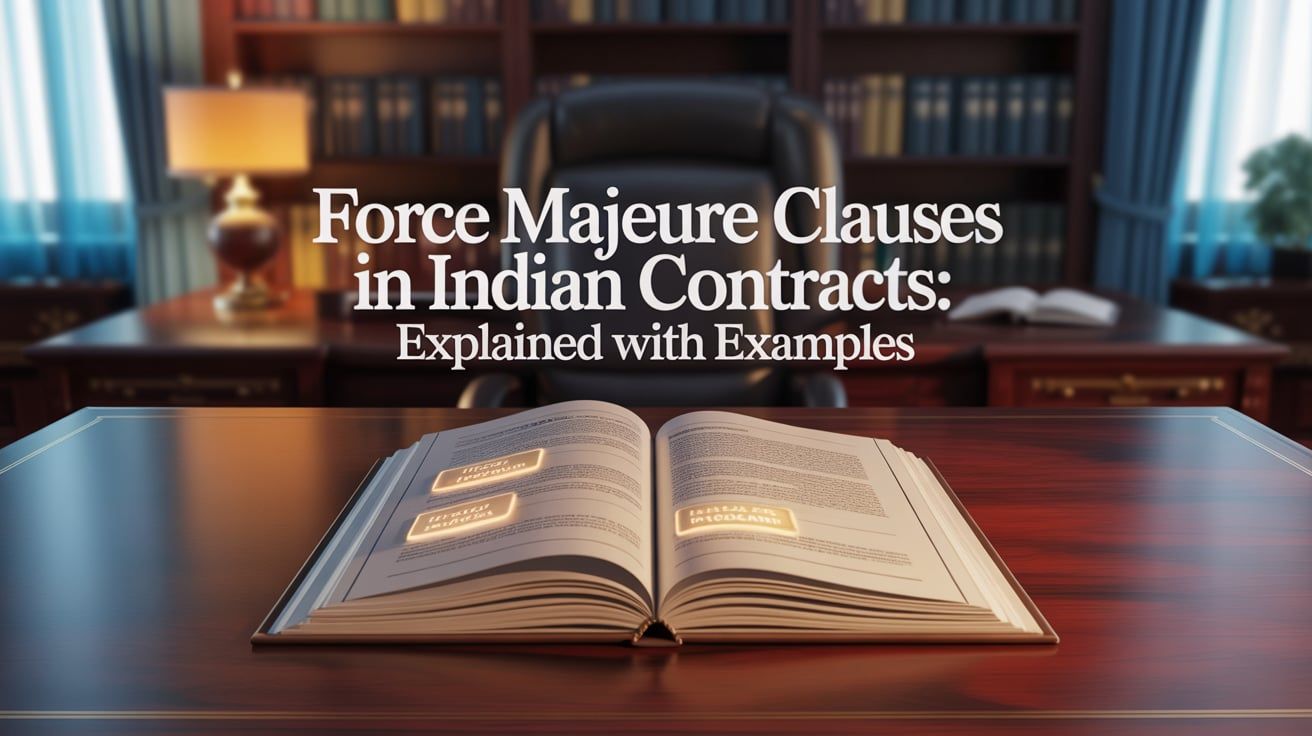Introduction: What Is Force Majeure, Really?
Every contract is built on a basic idea that both sides will keep their word. But in the real world, things don’t always go to plan. A factory floods. A war breaks out. The government suddenly announces a lockdown. What happens then?
Can you be blamed for not doing something that became impossible? Can the other side sue you for breach of contract? This is exactly where a Force Majeure clause matters.
In simple terms, Force Majeure means “an act of God” or a situation beyond your control that stops you from fulfilling your contract. It could be a natural disaster, a riot, a legal ban, or even a pandemic — anything unexpected that makes performance genuinely impossible. But it’s not a magic excuse. It only works if it’s written clearly in the contract, and if you act responsibly when the crisis hits.
Why Businesses Need It
You don’t need a pandemic to realize how fragile business deals can be. Let’s say you’ve signed a contract to deliver goods to a client by the 30th. But a state-wide strike shuts down transport. You can't get trucks on the road. You miss the deadline.
Now, if you don’t have a Force Majeure clause, your client might demand damages. But if you do, and if it’s properly worded, you might be protected or at least given more time to perform without penalty.
It’s not just about protection. It’s about clarity. Everyone knows what to expect when something unusual happens. And that kind of clarity can save relationships, reputations, and lawsuits.
The Legal Angle: What Indian Law Says
There’s no specific “Force Majeure Law” in India. But there are two important legal sections that come into play:
- Section 32 of the Indian Contract Act: Applies when the contract itself talks about events like floods or war and specifies the consequences. Courts will follow the clause if it exists.
- Section 56: The doctrine of “frustration of contract.” Applies when no clause exists, but an outside event makes fulfilment impossible. Harder to prove and not always accepted.
Bottom line? Don’t rely on courts to interpret things later. Put it in writing, upfront. A well-drafted Force Majeure clause saves time, money, and confusion.
What Counts as Force Majeure?
There’s no fixed list, but these are commonly included:
- Floods, earthquakes, tsunamis
- War, invasion, terrorism
- Riots, civil unrest
- Lockdowns or legal bans by government
- Strikes or industrial action
- Epidemics or pandemics (like COVID-19)
- Cyber-attacks (especially in tech contracts)
Example 1: A builder signs a contract to deliver 10 flats in 12 months. Six months in, a court order halts all construction. If “government or judicial restrictions” are included in the Force Majeure clause, the builder can seek an extension.
Example 2: A textile exporter agrees to deliver goods to Europe. A port workers’ strike disrupts shipping. If “labour unrest” is covered, the delay is excused.
The important thing is these examples only work if the events are specifically covered in your clause.
How to Write It Right
Let’s be honest — most businesses just copy a clause from another contract. Or worse, use an outdated template online. That’s risky. Here’s how to build a good Force Majeure clause:
- Be Specific: Mention events relevant to your industry (pandemics, floods, bans, strikes).
- Mention the Level of Impact: State whether delay is enough, or performance must be impossible.
- Add a Notice Period: Example: “The affected party must inform the other within 7 days.”
- Mention Duty to Mitigate: Show that you tried to overcome the problem.
- Termination Option: Allow contract termination if disruption lasts 60–90 days.
COVID-19: The Wake-Up Call
Before 2020, many contracts never even mentioned pandemics. Then came COVID-19: lockdowns, curfews, factory shutdowns. Contracts across India became impossible to perform.
One key case was Halliburton vs Vedanta in the Delhi High Court. The court held that lockdowns could qualify as Force Majeure, but only when performance was truly impossible — not just harder. Many government departments also issued circulars treating COVID-19 as Force Majeure in official contracts.
What Indian Courts Look At
If you ever end up in court over a Force Majeure claim, judges will check:
- Is the event covered in the clause? If not, you’re on weak ground.
- Did you inform the other party on time? Silence can kill your case.
- Did you try other ways to perform? Courts want proof of effort.
- Is there a clear link between the event and non-performance?
